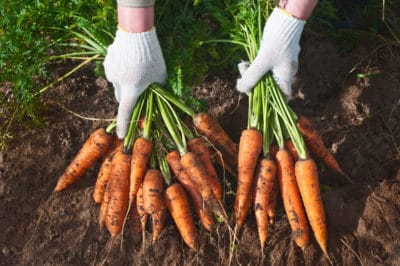First things first.
To keep carrots fresh, the most important thing to remember is that they need to stay hydrated. Whether you’re storing for a few days or a few months, carrots need to be protected from loss of moisture.
To keep your carrots crunchy and fresh, be sure to use airtight storage containers or resealable plastic bags for storage; you can also wrap tightly in aluminum foil. Be sure to use the coolest, most humid part of your refrigerator.
Storing for immediate use.
For the short term, there are a couple of ways to keep carrots.
The water method.
If you expect to use your carrots within a week or two, storing them is simple. Twist off the greens and place your carrots in a container full of water. Cover tightly and refrigerate. Now, just change the water every two or three days and your carrots will stay firm and fresh for up to three weeks.
The dry method.
Don’t wash, just twist off the greens and allow your carrots to sit out for six to eight hours so they are dry. Place them in a strong, resealable plastic bag or wrap in foil, then refrigerate. Just remember to wash your carrots before eating them!
Storing for the long term.
Properly prepared, stored carrots can last up to 18 months, so investing a little time in storing carefully is well worth it.
Sand
One of the easiest, most convenient ways to store your carrots is to keep them in a tub, covered in wet sand or sawdust. This does require someplace cool (just above freezing) and dark to keep the tub, but your carrots will last for months this way.
You don’t even need to wash your carrots first! Just twist off the greens, then bury your vegetables in the cold, wet sand. Make sure the tub stays cold, and you’ll have crunchy carrots for months at a time.
Freezing I
You can freeze carrots without blanching them! Simply twist off the greens, clean the carrots, and cut them into sticks or slices. Once your carrots are ready to be frozen, place them in a resealable plastic bag, flatten to remove as much air as possible, and freeze.
One advantage to this process is that the carrots will not go soft (as they do after blanching) and won’t lose flavor during storage.
Freezing II
If you prefer to blanch your carrots:
- Remove the greens
- Wash and peel your carrots
- Slice, dice, julienne, or chop as desired
- Place a batch of the carrots in boiling water for three minutes
- Immediately move to ice water to stop the cooking process
Leave the water boiling for the next batch.
After you’ve blanched all the carrots, let them drain, place in bags or containers, and put in the freezer. Blanching will usually result in carrots that are soft when defrosted, so you’ll be better off using them in soups, stews, and other cooked carrot dishes.
Note: If you’re blanching and freezing baby carrots, boil them for five minutes, then cool, drain and rinse as usual.
Canning and pickling.
Canning is an option for storing your carrots, although since they can be so easily frozen, canning isn’t really necessary. Should you choose to can your carrots, be sure to wash and peel them before beginning the process. Consult your pressure cooker instructions or other source for more specifics, since temperatures and processes can vary.
You can also pickle carrots. There are a number of methods and recipes for this, so find one that looks good to you and pickle away. Once pickled, your carrots will last for quite some time. They’re also delicious in salads!
A few things to know.
When storing carrots, there are couple of things to be aware of.
Don’t store any carrots near produce that produces ethylene gas. Avocados, bananas, mangoes, and other fruits give off this plant hormone which can cause nearby foods to begin to spoil.
If you’ve chosen to store your carrots dry, in the refrigerator, check them often for moisture; if moisture begins to collect in your carrot container, it could cause mold to develop. Should you find moisture in your refrigerated carrots, you can either store them differently (in water or wet sand, for instance or the freezer) or eat them immediately. Yum!
